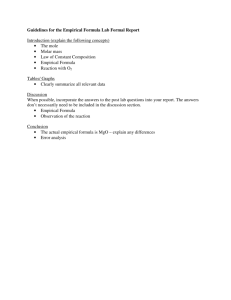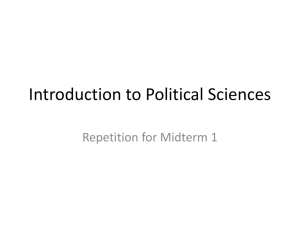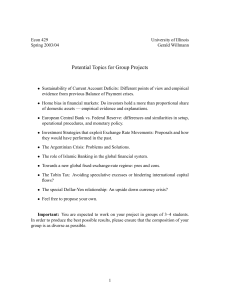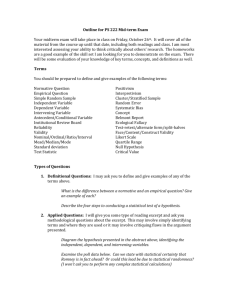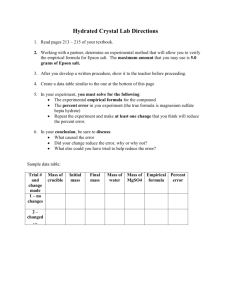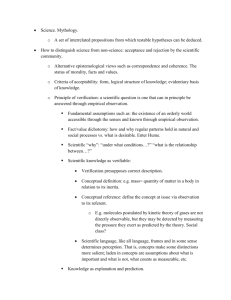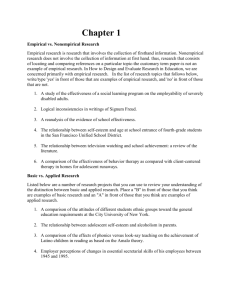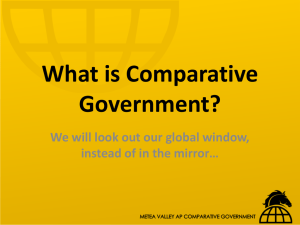What is Social Theory?
advertisement
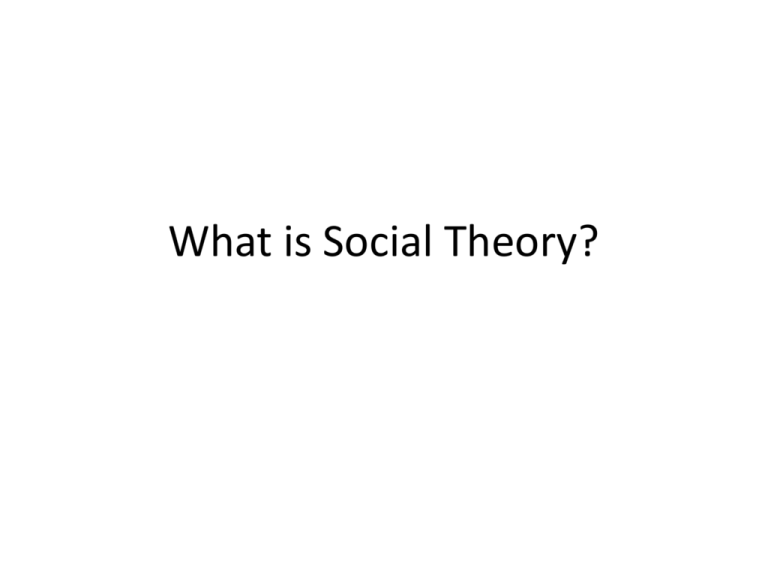
What is Social Theory? Theory Harrington 2005: 1-3 • Greek word theōria, opp. of praxis • contemplation / reflection • Reflection on the value and meaning of different modes of contemplating the world (art, myth, science, religion, etc.) • Reflection of the (social) world, but also of (social) science itself Different meanings of „theory“ • Theory – is in itself a contested term – Any form of systematically ordered propositions – Anything abstract (not about empirical cases) • Modern uses of „theory“: Sets of propositions allowing us to generalize. Thoughts providing explanation (establishing a causal relationship between variables), „source of explanatory concepts“ (Harrington 2005: 12) • Traditionally also: „source of ways of evaluating the point or use or meaning of such concepts“ (Harrington 2005: 12). – Philosophy of science (wissenschaftstheorie) – Meta-theory (theory about theories) Methods vs Methodology • Method: systematic procedure/technique to pursue a certain aim • Methodology: „principles governing the application of a set of methods“ „theory of methodical practice“ (Harrington 2005: 5) Social Theory, Common Sense and Social Context • Where does social theory come from? – From empirical observation (induction) – From any part of social life (not necessarily from a scientific activity), including everyday life, art etc. – „common sense“ can be seen as a social theory about the world (a very general, widespread and often quite blunt theory) – Every social theory is in some way related to the socio-historical context in which it occurs – It is not ABOVE ongoing social and political developments/struggles • Differences to everyday/common sense theories: – Social theory attempts to systematize and clarify the debate – It is usually more reflective and differentiated than common sense – It is constantly checked with reference to empirical evidence Objectivity • Is social science / social theory objective? – We cannot distance ourselves completely from the social world. We are a product of this world, we have a position / a standpoint in this world. This informs our theories (whether in social science or everyday life). Thus subjectivity creeps in. – Theory (whether scientific or everyday) supplies criteria for selection and discrimination, both with regard to the empirical object of study (observations) as well as with regard to explanations Facts • „something done“ • Refers to empirical reality (description) • But: facts are always laden with values • Without values/interests we do not distinguish one fact from another • What we look at, and how we perceive it ,is conditioned by our values/interests • Empirical description: what is? • Normative prescription: what should be? • We cannot completely disentangle empirical description from normative prescription (although that is what we might attempt) • Therefore: there is no objective truth to be found • Does that mean that every statement has the same claim to be true, that social science is completely relative, that we have no way of judging /evaluating social research? • No! • Theories / statements have more claim to be true, – If they show, how one arrives at that statement, giving reason at each step of the argument – If they explain, how a given reason can account for an observation – If others are able to follow the argument and come to the same conclusion • It is inter-subjectivity rather than objectivity that we can reach in social research Objectivity : separation of fact from value, of empirical description from normative prescription • Might be strived for, but never completely possible • Might be a/ the central goal in social research (August Comte: positivism) • Others deliberately start from a normative position • There are lots of positions in between Types of Social Theory • Normative, empirical, logical/deductive • Level of analysis: micro vs macro • Range: general/universal, mid-range, smallscale/specific • According to major independent variable • Materialism: socio-economic explanations, e.g. Marxism • Institutionalism: institutions determine social + political life, e.g. Aristotle, Montesquieu • Culturalism: culture as major driving force. Perceptions/Ideas/Values matter • Individualism: Rational Choice (actor centred, preferences, calculation of costs and benefits) • Neo-Institutionalism: institutions are facilitating and restricting options
